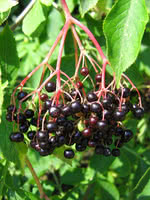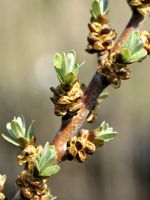Mon-Fri 9am - 5pm Mountain time
Black Elderberry vs Lord Sea Buckthorn (Male)
Sambucus canadensis
Hippophae rhamnoides Lord
NOT AVAILABLE THIS SEASON - MIGHT RETURN
Black Elderberry is a deciduous shrub native to eastern North America. You can plant this shrub in moist areas and it will help stabilize your soil. You can also use it on rural properties anywhere you'd use a lilac.
Black Elderberries are considered to be partially self-pollinating. So while they will still produce some berries without cross-pollination, planting with another variety will increase yields. Consider planting with Ranch Elderberry or Bob Gordon Elderberry.
Warning: the seeds, stems, leaves, roots, and uncooked berries of the Black Elderberry are poisonous to humans when eaten in quantity. You should cook the berries to make them safe for human consumption.
Lord Sea Buckthorn is a male variety that is a pollinizer for female plants. One male plant is capable of pollinating 5-7 female plants. Male Sea Buckthorn plants do not produce berries, but the pollen from their flowers allows female plant to set fruit.
Lord Sea Buckthorn has relatively thornless branches and other well-known features of Sea Buckthorn plants. These include silvery green foliage and nitrogen-fixing capabilities, which improves the surrounding soil.
Can be used to pollinize female Sea Buckthorn plants, including Orange Energy Sea Buckthorn.
Black Elderberry Quick Facts
Lord Sea Buckthorn (Male) Quick Facts
Toxicity: leaves, stems, and uncooked berries are poisonous to humans

